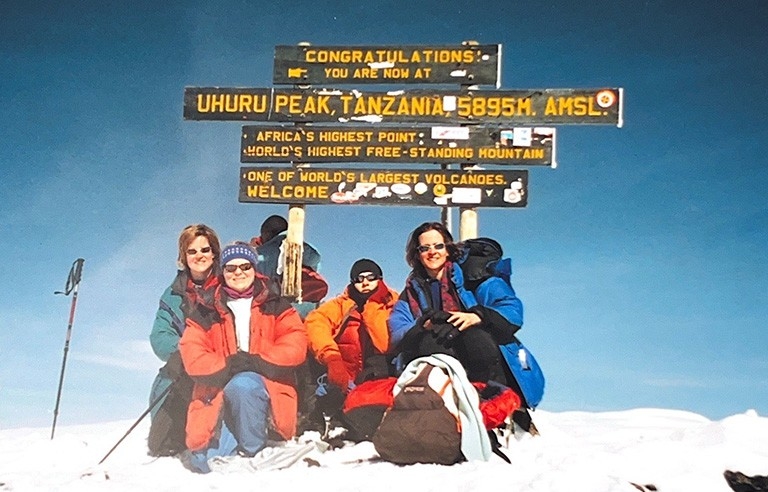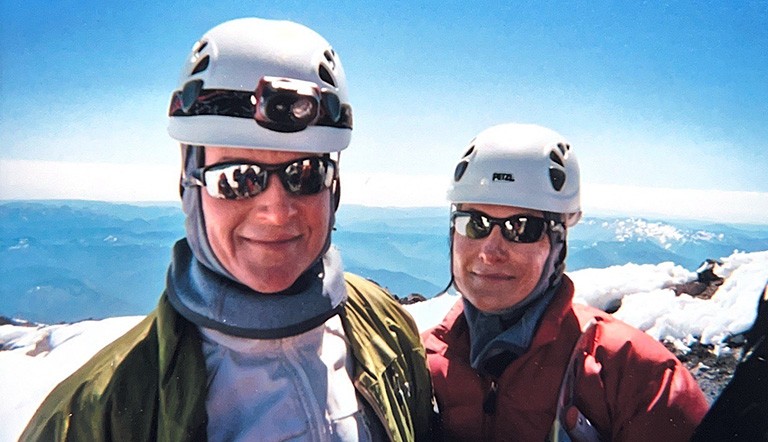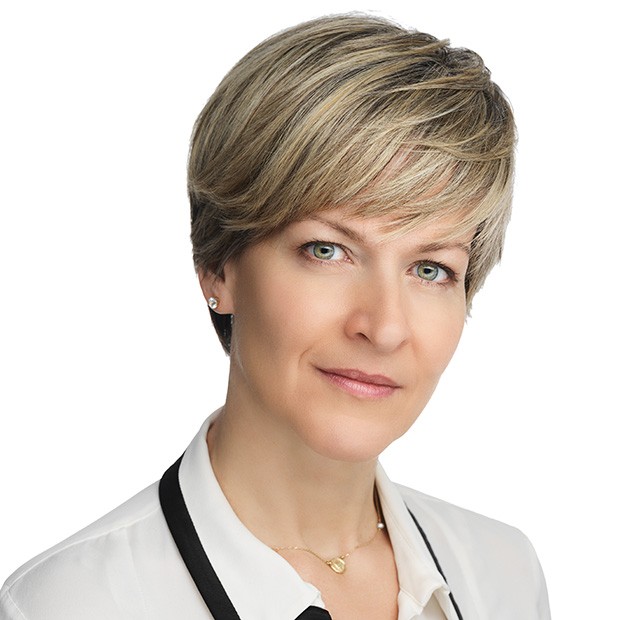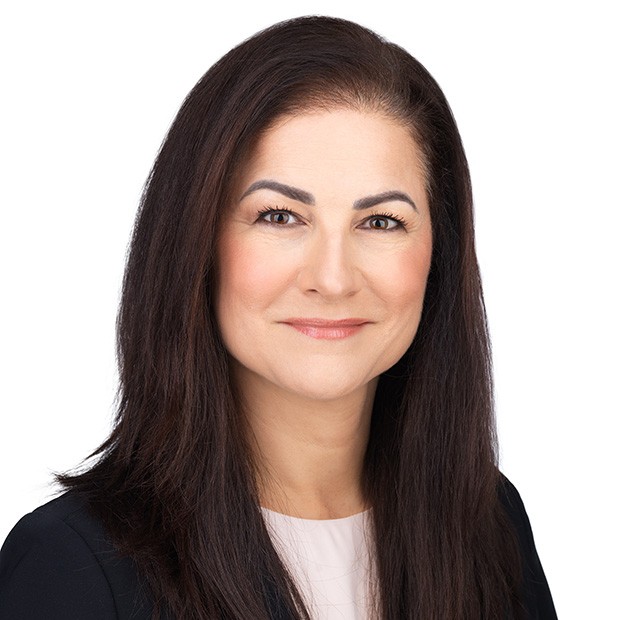From Concordia to Kilimanjaro: The ascent of CPAs Maria Mangiocavallo and Valdina Di Betta
 From left: Concordia alumnae Anneliese Di Betta, Isabelle Gryn, Maria Mangiocavallo and Valdina Di Betta at the summit of Mount Kilimanjaro, the world's highest free-standing mountain.
From left: Concordia alumnae Anneliese Di Betta, Isabelle Gryn, Maria Mangiocavallo and Valdina Di Betta at the summit of Mount Kilimanjaro, the world's highest free-standing mountain.
Misery loves company — and in the case of Concordia alumnae Maria Mangiocavallo, BComm 86, GrDip 89, and Valdina Di Betta, BComm 86, GrDip 89, a study buddy.
“We actually met because of a failure,” says Di Betta, now a senior manager of Special Loans and Advisory Services at the Royal Bank of Canada.
“Neither of us had ever failed a course in our lives, but we both failed the mandatory case course we needed to obtain our graduate diplomas at what is now the John Molson School of Business,” she explains. The course was a prerequisite to write the chartered professional accountant (CPA) exam.
Rather than stay home and dwell on the disappointment, Di Betta reached out to Mangiocavallo, an acquaintance from the undergraduate Accountancy program. Having heard that Mangiocavallo had a car, Di Betta suggested they take a holiday together.
“We teamed up and off we went on a vacation to lick our wounds,” Mangiocavallo says.
When they returned from their trip, Di Betta’s twin sister Anneliese Di Betta, BComm 86, GrDip 88 — who had written the exam successfully and earned her CPA designation — coached the friends, who turned studying into a full-time job. When it came time again to write the exam, they both passed.
“I look back at that initial failure, which was devastating to me at the time. I remember just crying for days. Finally my father got fed up and said, ‘That’s enough, just write it next year!’” says Di Betta.
“That’s true, it was a total shift in mindset,” Mangiocavallo adds.
From setback to success
So began a lifetime of travels across several continents. The two friends, along with Anneliese, have hiked the Grand Canyon, climbed Washington’s Mount Rainier, and even summited Tanzania’s Mount Kilimanjaro with another long-time friend and Concordia graduate, Isabelle Gryn, BComm 86.
Mangiocavallo attributes their shared success — in passing the infamous CPA exam and their many adventures — to the organizational skills and tenacity they honed at Concordia.
“We learned how to plan and how to persevere. We had to learn skills we never knew before in order to complete these climbs.”
“Concordia built my confidence,” says Di Betta.
 Di Betta (left) and Mangiocavallo at the summit of Mount Rainier, known for its technical climbing difficulty.
Di Betta (left) and Mangiocavallo at the summit of Mount Rainier, known for its technical climbing difficulty.
Breaking gender barriers
The friends were one of only two groups of women among the climbing parties on their Kilimanjaro trip. They were also the only women in their group of 12 that successfully completed a guided ascent of Mount Rainier via the challenging Kautz Route.
“The lead guide questioned us in front of everyone, asking how we passed the vetting process as we had ‘no real technical climbing experience.’ Maria saw his unconscious bias right away. We knew we were ready, as we had trained for almost a year, guided by qualified and competent professionals,” Di Betta recalls.
“We had to descend a steep, icy glacier on an exceptionally hot day. The record-breaking heat posed a risk that the ice bridges we were walking on would collapse. The guide was stressed, pressing the group to descend quickly. I was ill on the climb, but strong enough to continue. Maria was incredibly supportive, carrying some of my gear to lighten my load, but adding to hers.
“By the end of the climb, the lead guide recognized and acknowledged our skills.”
As self-described feminists, both alumnae say they were encouraged to resist the gendered expectations of their upbringings in their careers as well as their outdoor pursuits.
Though she was initially enrolled in the sciences at McGill University, Mangiocavallo was enticed by the career opportunities made possible by studying accountancy. Di Betta says her father and older brother were instrumental in encouraging her to pursue her studies.
“It was the ’80s. Our moms were pushing for us to get married, to have kids. But we wanted to be financially independent. And I had this incredible curiosity; I wanted to do and have more than my parents could,” Mangiocavallo explains.
“My dad was a very smart man, despite only having an elementary school education,” Di Betta adds. “He encouraged all his children to get an advanced education and to be independent. He drilled that into us.
“I decided to get my CPA as a challenge, as a contest to see if I could really do it. I knew it would open a lot of doors.”
 Valdina Di Betta, is a senior manager of Special Loans and Advisory Services at the Royal Bank of Canada.
Valdina Di Betta, is a senior manager of Special Loans and Advisory Services at the Royal Bank of Canada.
 Maria Mangiocavallo is vice-president of Commercial Banking for the Quebec region at Scotiabank.
Maria Mangiocavallo is vice-president of Commercial Banking for the Quebec region at Scotiabank.
Finding belonging at Concordia
When it came time to choose a school, Di Betta says she was attracted by Concordia’s diversity.
“I didn’t have the vocabulary at the time to describe it, but Concordia is so diverse. People didn’t talk about diversity then, but I felt at home.”
Mangiocavallo, who grew up in a predominantly Italian neighbourhood with Italian peers at school, concurs.
“I saw more people like me there. You know, they say ‘representation matters’ — it really did, even in the ’80s.”
Today, Mangiocavallo is vice-president of Commercial Banking for the Quebec region at Scotiabank and is actively involved in her community, supporting her alma mater as a member of the John Molson School of Business advisory board. She is also a long-time honorary co-president for the Concordia Golf Classic, one of the university’s signature fundraising events.
This past May, Mangiocavallo received the Humberto Santos Award of Merit and Service from the Concordia University Alumni Association in recognition of her exceptional service to the university community.
Reflecting on their journey, both friends recognize the impact of their shared experience. Their initial setback, which once seemed like a devastating blow, became the foundation for enduring success and an unbreakable bond.
“Looking back, that failure had an enormous positive consequence on my life,” says Di Betta.
“After that, we were unstoppable,” adds Mangiocavallo.